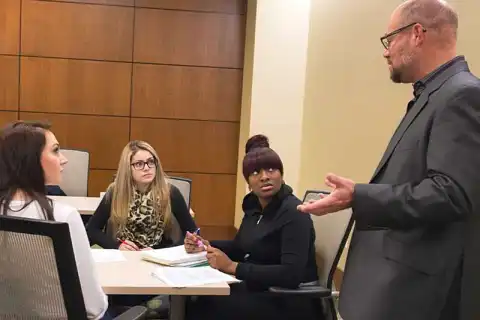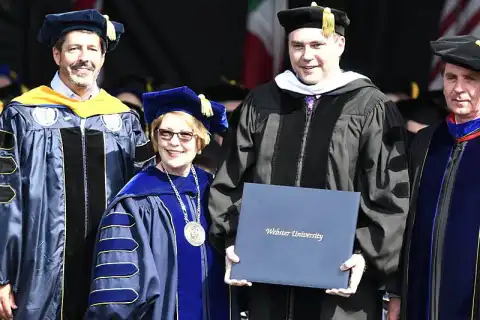Master of Arts - Migration, Climate Change and the Environment
- 2 years
- Duration
- 27,900 USD
- Price
- Rolling admission
- Start
- Rolling admission
- Deadline
- Master
- Degree
- Campus
- Format
- Vienna / Austria
- Location
- Webster University
- School
Program description
This MA program examines the interconnected issues of migration, climate change, and environmental degradation via the lens of the connection between these three broad themes.
Tools for analyzing and addressing migration in the face of environmental and climatic shifts are provided.
Through the MAMCE, students gain a fresh perspective on the interconnected nature of migration policy with other policy fields as well as a comprehensive awareness of contemporary migration dynamics and policy trends.
The course is designed to equip students with the knowledge and skills necessary to critically examine the role of migration in international environmental law, with a focus on climate change law.
Program structure
Main modules
The 36 credit hours required for the master of arts (MA) in migration, climate change and the environment must include the following courses:
- Introduction to Contemporary Migration Studies and Practice
- Research Methods and Perspectives
- Migration, Climate Change and the Environment
- International Migration Law
- Thesis and University Thesis Requirement
- Two courses from the Issues Cluster1
- Two courses from the Skills Cluster2
- Migration and Environment Electives3
1Issues Cluster (2 courses)
- Migration and Health
- Politics of Development
- Area Studies
- Humanitarian Issues in International Politics: Refugees and Migration
- Issues in International Politics: Global Governance and Sustainable Development Goals
2Skills Cluster (2 courses)
- International Environmental Law
- International Human Rights Law and Organizations
- International Political Economy
- International Law
- International Disaster Law
- International Organizations
- The UN in International Politics
- Food and Water Security
- Energy Security
- International Security
3Migration and Environment Electives (2 courses)
- Principles of Negotiation
- International Humanitarian Law
- International Human Rights Law and Organizations
- Field Work
- Professional Seminars
- Internship
- Any other graduate elective course
Price
Fee for education is 27900.00 USD for international students
This list does not include all fees charged by Webster University.
- Application Fee (non-refundable) - $50
- Graduation Fee (non-refundable) - $130
- Transcript Fee - $20
- Study Abroad (non-refundable) - varies
NOTE: Courses in various academic programs sometimes require expendable supplies or services, and in these cases the student may be billed a class fee for such costs.
Requirements for applicants
- Applicants considered for admission to graduate studies at Webster University must hold an earned baccalaureate degree from an accredited educational institution recognized by Webster University, and meet all program admission standards. Applicants who have a completed baccalaureate degree from a U.S. accredited institution must satisfy program requirements or requisites, including a 2.5 (on a 4.0 scale) minimum cumulative Grade Point Average (GPA) at their baccalaureate degree granting institution for full admission. Students who completed their university education outside the U.S. must have earned an equivalent recognized baccalaureate degree as determined by Webster University. Students who have the necessary academic preparation for admission to accredited/recognized master's-level university programs in their native system of education, providing their academic preparation was at least three years in length, will be considered for admission using Webster University admission criteria. Consideration includes a minimum, cumulative GPA as calculated by Webster University.
- A curriculum vitae (résumé) that documents prior employment and experience or an essay on a topic of the student's choice, such as a special interest, significant experience or notable achievement. Minimum 300 word count in length.
English Proficiency for international student applicants:
Successfully meeting the requirements for one of the following tests within the last two years:
- TOEFL: jBT: 80
- TOEFL: pBT: 550
- IELTS: Academic: 6.0
- Duolingo: 110
- Pearson: 53
- Cambridge Academic English: 169
- Password: 6.0
- GTEC: 1201
- jTEP: 3.7
- SAT's English-based Reading and Writing Score: 450
- ACT composite score: 23
- Completion of at least one year academic of college-level coursework for undergraduate students at a regionally accredited U.S. institution of higher learning within the last three years. It must be academic coursework that is completed; ESL coursework does not qualify.
- Completion of at least one semester of graduate-level courses with grades of B or higher at a regionally accredited U.S. institution of higher learning within the last three years. Coursework must be academic; ESL coursework does not qualify.
- If a student has completed three or more years of study in an English-medium high school or university-level academic program in a country other than ones listed above, he/she may request a waiver.
- Successful completion of the ELS Language Center's English for Academic Purposes or ELS Language Center Level 112 (must have valid ELS 112 Certificate of Completion).
- Successful completion of the University of Central Florida's Center for Multilingual Multicultural Studies (CMMS) Intensive English Program (must have valid completion certificate).
About the university

The extraordinary history of Webster University, which was founded in 1915 by the Loretto Sisters with the goal of making higher education more accessible to all, can be traced back to that same commitment to racial equality.
The growing interconnectedness of our world has prompted us to spend the last four decades creating a global network of engaged academics and alumni who work together to create meaningful connections in their local communities and beyond.
Our Core Values
- Students - keeping small classes, personal connections with professors and staff, and a focus on the needs of individual students is one way to ensure a truly global education for every student.
- Learning - for this purpose, we aim to develop educational programs that combine theory and practice; provide an international perspective; encourage creativity; and foster a lifelong desire to learn.
- Diversity and Inclusion - Instilling in students an appreciation for diversity and an understanding of their own and others' values by creating an environment that is accessible to individuals of diverse cultures, ages, and socioeconomic backgrounds.
- Global Citizenship - in order to educate and empower a wide range of people from all walks of life, as well as to protect the environment and strengthen the communities we serve.
Campuses and Locations
No matter where you live or work, our undergraduate and graduate programs are here to help you reach your professional and personal goals. We have campuses in USA, China, Greece, Austria, Switzerland and others.





